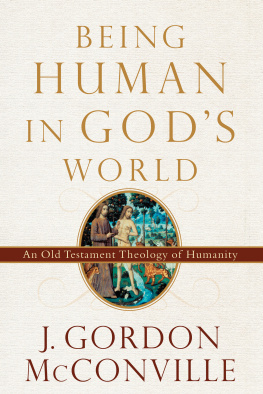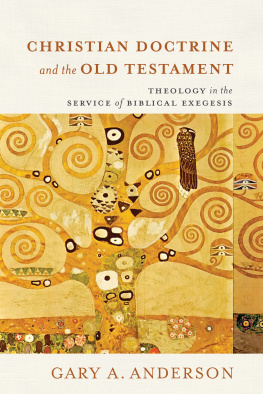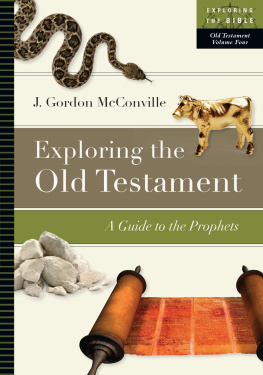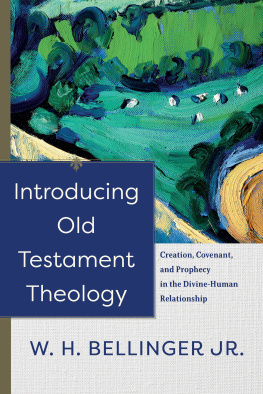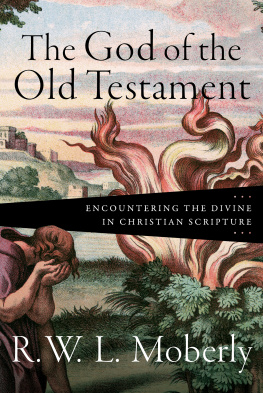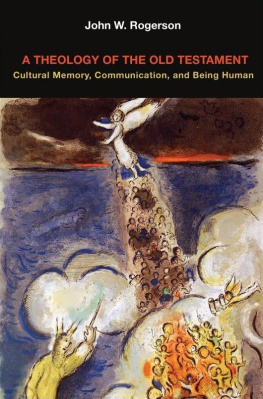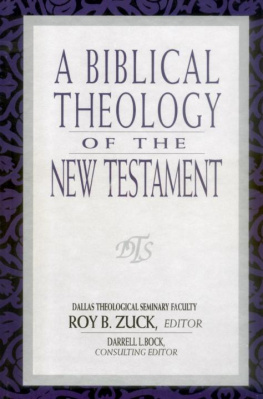J. Gordon McConville - Being Human in Gods World: An Old Testament Theology of Humanity
Here you can read online J. Gordon McConville - Being Human in Gods World: An Old Testament Theology of Humanity full text of the book (entire story) in english for free. Download pdf and epub, get meaning, cover and reviews about this ebook. year: 2016, publisher: Baker Publishing Group, genre: Religion. Description of the work, (preface) as well as reviews are available. Best literature library LitArk.com created for fans of good reading and offers a wide selection of genres:
Romance novel
Science fiction
Adventure
Detective
Science
History
Home and family
Prose
Art
Politics
Computer
Non-fiction
Religion
Business
Children
Humor
Choose a favorite category and find really read worthwhile books. Enjoy immersion in the world of imagination, feel the emotions of the characters or learn something new for yourself, make an fascinating discovery.
- Book:Being Human in Gods World: An Old Testament Theology of Humanity
- Author:
- Publisher:Baker Publishing Group
- Genre:
- Year:2016
- Rating:4 / 5
- Favourites:Add to favourites
- Your mark:
- 80
- 1
- 2
- 3
- 4
- 5
Being Human in Gods World: An Old Testament Theology of Humanity: summary, description and annotation
We offer to read an annotation, description, summary or preface (depends on what the author of the book "Being Human in Gods World: An Old Testament Theology of Humanity" wrote himself). If you haven't found the necessary information about the book — write in the comments, we will try to find it.
Being Human in Gods World: An Old Testament Theology of Humanity — read online for free the complete book (whole text) full work
Below is the text of the book, divided by pages. System saving the place of the last page read, allows you to conveniently read the book "Being Human in Gods World: An Old Testament Theology of Humanity" online for free, without having to search again every time where you left off. Put a bookmark, and you can go to the page where you finished reading at any time.
Font size:
Interval:
Bookmark:
2016 by J. Gordon McConville
Published by Baker Academic
a division of Baker Publishing Group
P.O. Box 6287, Grand Rapids, MI 49516-6287
www.bakeracademic.com
Ebook edition created 2016
All rights reserved. No part of this publication may be reproduced, stored in a retrieval system, or transmitted in any form or by any meansfor example, electronic, photocopy, recordingwithout the prior written permission of the publisher. The only exception is brief quotations in printed reviews.
Library of Congress Cataloging-in-Publication Data is on file at the Library of Congress, Washington, DC.
ISBN 978-1-4934-0442-1
Unless otherwise indicated, translations of Scripture are those of the author.
Scripture quotations labeled ESV are from The Holy Bible, English Standard Version (ESV), copyright 2001 by Crossway, a publishing ministry of Good News Publishers. Used by permission. All rights reserved. ESV Text Edition: 2011
Scripture quotations labeled KJV are from the King James Version of the Bible.
Scripture quotations labeled NASB are from the New American Standard Bible, copyright 1960, 1962, 1963, 1968, 1971, 1972, 1973, 1975, 1977, 1995 by The Lockman Foundation. Used by permission.
Scripture quotations labeled NIV are from the Holy Bible, New International Version. NIV. Copyright 1973, 1978, 1984, 2011 by Biblica, Inc. Used by permission of Zondervan. All rights reserved worldwide. www.zondervan.com
Scriptures quotations labeled NRSV are from the New Revised Standard Version of the Bible, copyright 1989, by the Division of Christian Education of the National Council of the Churches of Christ in the United States of America. Used by permission. All rights reserved.
Scriptures quotations labeled RSV are from the Revised Standard Version of the Bible, copyright 1952 [2nd edition, 1971] by the Division of Christian Education of the National Council of the Churches of Christ in the United States of America. Used by permission. All rights reserved.
For my wife, Helen
Far more precious than jewels

Cover
Title Page
Copyright Page
Dedication
Preface
Abbreviations
Introduction: On Thinking about Being Human
1. Humanity in the Image of God ( Imago Dei )
2. Like God in the Garden of Eden (Gen. 23)
3. The Human Constitution in the Old Testament
4. The Situated Self
5. The Old Testaments Transformations and the Spiritual Sense
6. Embodiments: Place and Memory
7. The Political Self
8. Male and Female
9. Work and Creativity
10. The Old Testament and Human Formation: The Psalms
Bibliography
Subject Index
Author Index
Scripture Index
Back Cover
To attempt to write a book with Being Human in the title may seem uncomfortably close to propounding a theory of everything. If there is a good reason for doing so, it lies in the fact that, both within and outside communities of faith, we are surrounded implicitly and explicitly by concepts of what being human means. What is offered here, therefore, is not some definitive verdict on the subject, but rather an indication of ways in which a biblical theology might bear upon it. The chief weight of the argument falls on the Old Testament, as the title declares. In my attempt to develop an Old Testament Theology of Humanity I take this to have a context in a theology of the Old and New Testaments, and in Christian theology more generally. I hope this will be clear from the pages that follow, though it may turn out to be clearer that I am more at home in the Old Testament than in other branches of theology! Yet I think that my interest in the topic has been born of my study of the Old Testament. Because of its rootedness in the history, geography, culture, languages, literature, and wisdom of a people, it is not only an immeasurable resource for the subject but even forces it upon the readers attention. By its nature, therefore, I believe it has an indispensable place in Christian theological thinking about being human.
The book has an origin not only in my thinking about the Old Testament in general but also in my particular preoccupation in recent years with biblical spirituality. What I mean by this will appear below. In the confines of a preface, I will say about it only that I take the scholarly quest for meaning in the biblical text to be inseparable from the personal engagement of the inquirer in the task and its subject matter. This being so, what follows should be regarded as an essay in reading the Bible in pursuit of a greater understanding of oneself, individually and in ones various communities, as a human being. As such it seeks to indicate a certain practice of understanding rather than to say all that might be said. Plainly the volume does not do the latter, and another author might well have selected different specific topics from the ones that make up the argument here. Parts of the argument build on essays and conference papers published elsewhere, and these are acknowledged at appropriate places.
Many people have contributed, in various ways, to the making of this book. If it has strengths, I owe those strengths to them. Its weaknesses will mean that I did not learn from them carefully enough. Its immediate provenance is from a project on Biblical Spirituality sponsored by Bible Society (UK) and based in the School of Humanities at the University of Gloucestershire. I am grateful to Bible Society for their sponsorship, and especially to David Spriggs, an Old Testament scholar himself, who participated actively with us in the development of the project. My colleagues Andrew Lincoln and Lloyd Pietersen were my chief comrades over the four years or so of the project. Their stimulus and encouragement have been immeasurably important to me, and I owe them an enormous debt. Sheona Beaumont, as a doctoral student on the project, brought important insights from the interface of theology and art.
Among the numerous colleagues from other universities and nations who participated in the project, I record my gratitude to Pieter de Villiers, who took a leading part in two international symposiums on the subject at the University of Gloucestershire in Cheltenham. These resulted in two publications: The Bible and Spirituality: Exploratory Essays in Reading Scripture Spiritually and The Spirit That Inspires: Perspectives on Biblical Spirituality .
I am also grateful to members of the Bible and Spirituality research group within the School of Humanities, which was an important venue for sharing ideas not only from within theology but also from other subject areas, especially English and history. As well as those already named, the group included our colleagues Melissa Raphael, Shelley Saguaro, Anna French, and Hilary Weeks. And the Theology Reading Group, with colleagues Dee Carter and Philip Esler, and coordinator Paul Caddle, has left its mark here in ways that they will recognize.
Finally, my thanks to Jim Kinney and Baker Academic for accepting this volume for publication (and to Tim West for preparing the manuscript so carefully). Jim has been both enormously patient and encouraging, as well as a stimulating conversation partner in matters theological, over a number of years. And I am delighted to be able to join him in offering the pages that follow.
Cheltenham, July 3, 2015
. Andrew T. Lincoln, J. Gordon McConville, and Lloyd K. Pietersen, eds., The Bible and Spirituality: Exploratory Essays in Reading Scripture Spiritually (Eugene, OR: Cascade, 2013); Pieter de Villiers and Lloyd Pietersen, eds., The Spirit That Inspires: Perspectives on Biblical Spirituality , Acta Theologica Supplementum 15 (Bloemfontein, South Africa: University of the Free State Press, 2011).
Font size:
Interval:
Bookmark:
Similar books «Being Human in Gods World: An Old Testament Theology of Humanity»
Look at similar books to Being Human in Gods World: An Old Testament Theology of Humanity. We have selected literature similar in name and meaning in the hope of providing readers with more options to find new, interesting, not yet read works.
Discussion, reviews of the book Being Human in Gods World: An Old Testament Theology of Humanity and just readers' own opinions. Leave your comments, write what you think about the work, its meaning or the main characters. Specify what exactly you liked and what you didn't like, and why you think so.

